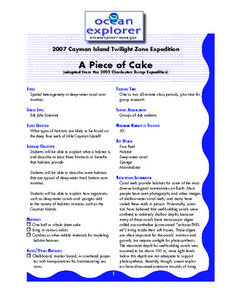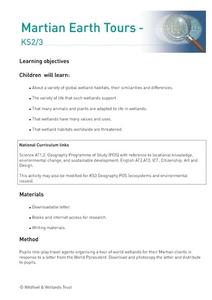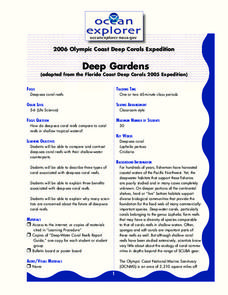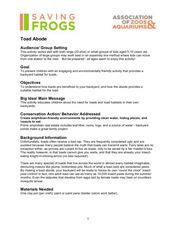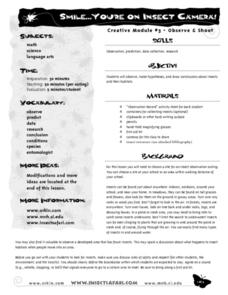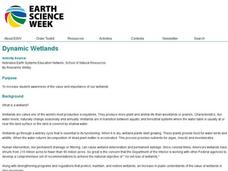Curated OER
Fish Banners
An art lesson involving fish can accent a wide variety of subjects. Here are the steps needed to create a fish banner with paint, shapes, cardboard, and paper. This would be a nice way to start or finish a unit on fish or underwater...
Curated OER
The Great Pond Safari
Students study pond life by visiting a pond and completing an associated worksheet. They play an online game based on the pond learning experience.
Curated OER
A Home for a Cricket
First graders build a habitat for crickets after studying animal survival needs. They care for and observe the crickets in the classroom habitat.
Curated OER
Adaptation and Diversity on Sheffield Island
Written for an exploration of shoreline ecosystems on Sheffield Island, this gives ecology or marine biology buffs a hands-on experience. Using GPS or visual triangulation techniques, they lay transect lines on a high and a low energy...
NOAA
Stressed Out!
Are our oceans really suffering due to the choices humans make? The sixth and final installment in the volume of activities challenges research groups to tackle one of six major topics that impact ocean health. After getting to the...
Curated OER
Our Schoolsyard is Full of Biology
Students study the habitats found in their schoolyard. They apply firsthand, what they have learned in the classroom to something familiar to them. Students look at biotic, abiotic habitats. Small groups will present their findings to...
Curated OER
The Magic School Bus Gets Swamped
Students participate in an experiment that shows them how wetlands filter dirty water. They work in groups to accomplish this experiement with the help of supervisors. A bulletin board can be created to show the plants and animals that...
Curated OER
Habitat Lap Sit
Fourth graders physically form a circle that shows the interconnectedness of the components of a habitat. They form circles and role play the parts of habitats.
Curated OER
Wolf Habitat
Students identify their own basic needs for food, water, shelter and space in a suitable arrangement. They generalize that wolves and people have similar basic needs.
Curated OER
Head to Foot
Students describe the body form and major anatomical structures of squids and describe some unusual or unique features of newly-discovered deep water squid species. They infer what types of food squids use from their anatomical features.
Curated OER
Endangered Spaces = Endangered Species!
Sixth graders discuss the crowding, loss of personal space, loss of home, loss of food, etc. that might occur at a developmental site. They witness, through an in-class demonstration, what happens when land is taken for development. They...
Curated OER
Helping Plants Grow Well
Students explain the effect of water, temperature and light on plant growth.
Curated OER
A Piece of Cake: Ocean Communities
Students explain habitats. In this model based lesson plan students create a model to help describe a habitat that is typical of deep-water. Students will describe how organisms such as coral and sponges add to their habitat.
Curated OER
Martian Earth Tours
Students study a variety of global wetland habitats, their similarities and differences. They examine the variety of life that such wetlands support and determine that many animals and plants are adapted to life in wetlands, that...
Curated OER
Pond Life
Students recognize the habitats of animals that live near or in a pond. In this pond lesson, students examine pond water and look for pond organisms. Students observe organisms with a loupe and complete a worksheet.
Curated OER
Deep Gardens
Students investigate the differences and similarities between shallow-water and deep-sea coral reefs. In this coral reef lesson, students research and compare the characteristics of reefs. Students describe various lifeforms...
Curated OER
Building an Underwater Habitat
Students investigate underwater habitats. In this underwater habitat lesson, students study Aquarius and design their own underwater habitat that can sustain life. Students work in groups and present their habitats to the class. Students...
Curated OER
Toad Adobe
Students explore the importance of toads and the need for toad habitats in the environment. In this animal habitats lesson, students create an adobe habitat for toads by using a clay pot. Students paint their pots and place them in their...
Curated OER
Smile...you're on Insect Camera!
Students study insects. They go on an outdoor insect outing and look for insects in a variety of places--in the air, under rocks, on leaves, in water, etc. They record information about the insects they find, including habitat, weather...
Curated OER
Pea Soup Ponds
Students perform an experiment where they learn how water can be polluted by algal bloom. They grow algae with different concentrations of fertilizers or nutrients and analyze their results.
Curated OER
Deep Gardens
Learners compare and contrast deep-sea coral reefs with shallow-water coral reefs. In this underwater ecology lesson, students describe three types of coral and explain why scientists are concerned about the future of deep-sea coral.
Curated OER
Dynamic Wetlands
Students construct and observe a model of two different types of wetlands. In this wetlands lesson, students create a model of a wetland with constant drainage and a wetland that maintains a well-saturated soil. Students observe and...
Curated OER
The Journey of the Pacific Salmon
Students examine the journey of the Pacific salmon. In this salmon species instructional activity, students review the stages of the salmon life cycle and conduct an experiment to determine how the water and habitat changes during each...
Curated OER
Managing the Everglades Ecosystem
Students explore the Everglades ecosystem using the Internet. To develop a picture about conservation of resources in the context of the Everglades. Explore relationships between species and habitats. Develop an idea of how human beings...
Other popular searches
- Animals Water Habitats
- Animal Water Habitats
- Land or Water Habitats
- Shallow Water Habitats
- Water Habitats Lesson Plans
- Describe Water Habitats
- Water Habitats Rivers














